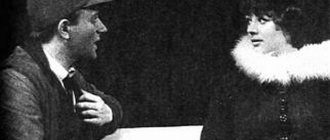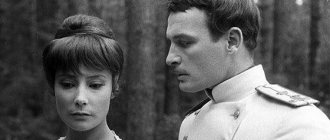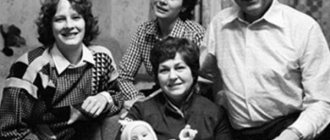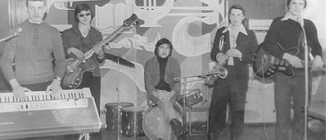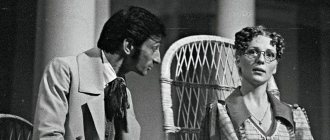Views: 165
Andrei Mironov is one of those actors who are born once in a century. He became famous in theater and cinema already in his youth, played the best roles and was loved by the most beautiful women. But the profession for which he lived became the reason for his early departure.
Andrey Mironov. Photo soreal.ru
Andrei was born in Moscow on March 7, 1941, shortly before the start of the war with Germany. His parents were famous pop artists Maria Mironova and Alexander Menaker . The first years of the child’s life were spent in Tashkent, where the family was evacuated along with the Variety and Miniature Theater, where both actors served. At the first opportunity they returned to Moscow.
Andrei, according to tradition, bore his father’s surname, but when an anti-Semitic campaign began in the country, his parents changed his surname to Mironov.
Alexander Menaker and Maria Mironova. Photo liveinternet.ru
The boy spent his childhood in a creative atmosphere. Thanks to his parents, he was lucky enough to communicate with many famous personalities, including Faina Ranevskaya , Mikhail Zoshchenko , Valentin Kataev and Leonid Utesov . Despite her busy schedule, the mother paid great attention to raising her son. Andrey stood out from his peers with his inner freedom and erudition. While still a teenager, he was well versed in literature, music, knew English well and loved the theater. Andrei studied in the school theater club, and in high school - in the studio at the Central Children's Theater.
Andrei Mironov in his school years. Photo the-most-beautiful.ru
Mironov dreamed of a theatrical career and did not even consider other professions. And the parents wanted to see their son as a diplomat or translator, but they allowed him to go his own way. In 1958, Andrei entered the Shchukin Theater School
to the workshop
of Joseph Rapoport
.
Biography
Andrei Aleksandrovich Mironov was born into a family of famous artists Maria Mironova and Alexander Menaker. And although the son was born on the evening of March 7, the parents indicated the date of birth a day later - March 8, in honor of women's holiday.
In 1948, Andrei, then still bearing his father’s last name, Menaker, went to first grade at a Moscow school. In 1950, the parents decided to change the boy’s last name, and he became Andrei Mironov. In one of his interviews, Andrei Mironov recalled: “In childhood and youth, I spent most of my time with my parents. Thanks to them, I was lucky enough to communicate with wonderful theater, film, and pop actors. Mikhail Zoshchenko, Valentin Kataev, Boris Efimov, Vera Maretskaya, Faina Ranevskaya often visited us. One of our family’s closest friends was Leonid Osipovich Utesov. My whole childhood was connected with him, with his songs.”
In 1958, Mironov graduated from school and applied to the B.V. Shchukin Theater School at the Yevgeny Vakhtangov Theater. Having passed all the exams, he was enrolled in the first course, which was led by actor, teacher and director Joseph Rapoport.
“I never hesitated in choosing a profession. After graduating from school, he submitted documents to the Shchukin State Theater School. Like all parents, my dad and mom wanted the best for me. Seeing my desire to become an actor, they never dissuaded me. But they didn’t promise an “easy life,” says Mironov.
Admission of Andrei Mironov to the theater school named after. Shchukin was a surprise for his parents. In the summer of 1958, they went on tour to the Far East, and when they returned, Maria Vladimirovna heard from Maria Sinelnikova, an actress of the Vakhtangov Theater she accidentally met on the street: “You know, we accepted one guy with your last name. A very funny boy."
Childhood
Andrey Aleksandrovich Manaker was born on March 7, 1941. His parents, famous pop artists of that time Alexander Semenovich Manaker and Maria Vladimirovna Mironova, decided to write down the date on their son’s birth certificate not “7”, but “8 March”, which later appeared in his documents.
In the first grade in 1948, Andryusha went with his father’s surname, however, in the second grade he went with his mother’s surname, since in the light of the anti-Semitic “fight against cosmopolitanism” it was unsafe to bear a Jewish surname. So Andrei Manaker became Andrei Mironov.
The actor’s mother, talking about his childhood, did not note that her son had any great hobbies or diligence in his studies. His relationship with the exact sciences was especially difficult. The boy's only short-lived hobby was collecting stamps.
Theater
In 1962, after graduating from college, Mironov was accepted into the troupe of the Moscow Satire Theater, in which he played until the last days of his life. At the Satire Theater, Andrei Alexandrovich made his debut with the role of Garik in the play “24 Hours a Day”. This was followed by roles in the plays: “The Sword of Damocles”, “Gury Lvovich Sinichkin”, “The Tricks of Scapin”, “The Bedbug”.
Real theatrical popularity came to Mironov after the role of Jerboa in the play “The Convent,” which premiered in 1964. Then there were the roles of Don Juan (“Don Juan, or Love of Geometry”), Zhadov (“Profitable Place”), Figaro (“Crazy Day, or The Marriage of Figaro”), Khlestakov (“The Inspector General”), Chatsky (“Woe from Wit”) "), Mecca the Knife ("The Threepenny Opera"), Vasilkov ("Mad Money"), Lopakhin ("The Cherry Orchard"), etc.
Andrei Mironov’s last role in the theater was Klaverov in the play “Shadows” based on Saltykov-Shchedrin, directed by himself.
The path to the cinema
The future actor's first screen tests for a role in the crowd of the film "Sadko" in the summer of 1952 were unsuccessful - the director rejected the boy because he wore a fashionable T-shirt over the orphan costume that suited the script.
The boy first appeared on stage at school in the student production “Russian People” based on the work of Konstantin Simonov. He got the role of von Krause. Since then, theater has become an integral part of his life: first, a school theater studio, then a theater studio at the Central Children's Theater, and eventually, admission to the Shchukin Theater School.
On March 19, 1962, Andrei Mironov, despite the ban on students acting in films, made his debut in the film “And if this is love?” years.
In all subsequent years, Andrei Mironov was constantly involved in both theatrical productions, radio plays, and films. Many characters in Soviet cartoons speak in his voice. The most famous films with his participation:
- “Beware of the Car” (1966);
- “The Diamond Arm” (1969);
- “The Incredible Adventures of Italians in Russia” (1974);
- "12 chairs";
- “An Ordinary Miracle” (1979);
- “The Man from the Boulevard des Capuchins” (1987), which became his last film work.
Andrei Mironov was known and loved by the public as the hero of light, comedic or musical films, while the soul of the actor himself strove for dramatic roles, for heroes with a subtle organization and a complex fate. His dream was a role in Tarkovsky's film, but Tarkovsky did not find him suitable for his work. Nikita Mikhalkov also did not offer cooperation.
Movie
In 1962, Andrei Mironov made his film debut. He played Peter in Yuli Raizman's film "What if this is love?" Subsequently, he recalled with gratitude his work with Yuliy Raizman, emphasizing that in this sense he was extremely lucky. “...On the set there was an atmosphere similar to that of a theater, so it was a pleasure to work,” the actor recalled.
This was followed by a role in the film story “My Little Brother” by Alexander Zarkhi (1962), and soon the comedy “Three Plus Two” (1963) by Henrikh Oganisyan was released.
In 1965, Eldar Ryazanov invited him to appear in his film. Andrey got the role of the scoundrel Dima Semitsvetov in the comedy “Beware of the Car.” The film was a huge success, and Mironov's role was recognized by critics as one of the best in the film.
In 1967, the actor starred in the famous comedy by Leonid Gaidai “The Diamond Arm”. It was in this film that Mironov made his debut as a singer (he sang the song “Island of Bad Luck”). Starting from this film, he began to often perform songs, both in films and during creative evenings.
In the seventies of the last century, Andrei Mironov especially starred in films. In 1971, several films with his participation were released, including the heroic adventure film by Vladimir Bychkov “Property of the Republic”, the comedy by Eldar Ryazanov “Old Robbers”. In 1973, Ryazanov again invited Mironov to play the main role in the film “The Incredible Adventures of Italians in Russia.”
Mironov starred in the television vaudeville "Lev Gurych Sinichkin" (1974), the musical comedies "Straw Hat" (1974) and "Sky Swallows" (1976), in the films of Mark Zakharov "The Twelve Chairs" (1977) and "An Ordinary Miracle" (1978 ), in the films of Nahum Birman “A Step Toward” (1976) and “Three in a Boat, Not Counting the Dog” (1979), etc.
In the 1980s, Mironov continued to work actively in cinema and theater and toured extensively throughout the country. At this time, he starred in the films “The Collapse of Operation Terror” (1980), “Assignment” (1980), “Be My Husband” (1981), “A Tale of Wanderings” (1982), “Somewhere in the Provincial Garden” ( 1983), “The Blonde Around the Corner” (1984). Critics believe that of all Mironov’s famous films, the actor’s genius was most clearly demonstrated in the film “My Friend Ivan Lapshin” (1984). The fragment, when Andrei Mironov’s character tries to shoot himself in the bathroom, is still taught to students of theater universities. The depth and tragedy of the image were amazing.
Andrei Mironov’s last film work was the role of Mr. Fest in Alla Surikova’s film “The Man from the Boulevard des Capucines” (1987).
Films with Andrei Mironov
The actor’s filmography includes about 50 films. In most of them, Andrei starred as the main character. All his characters are bright, colorful and memorable, they immediately evoke sympathy. The most successful films in Mironov’s creative career were:
- "Property of the Republic";
- "Old Robbers";
- "Family happiness";
- "New Year's kidnapping."
In 1973, a new cult film was released with the participation of the People’s Artist - it was the comedy “The Incredible Adventures of Italians in Russia.” In this witty and dynamic film, the actor performed all the stunts himself. The film quickly won the hearts of Soviet citizens; more than 50 million people watched it.
Three years later, Mironov again delighted the audience. This time he appeared in a film called “12 Chairs.” This is another significant role in the artist’s creative career. And the song “My Sail Is White” performed by him still remains popular.
Most often, Andrei was invited to star in comedy and musical films. Although many fans were sure that the actor would do an excellent job in dramatic roles. However, the artist managed to participate in serious projects; he played an unusual role for himself in the film “Shadows.” And later he appeared as a minister in the film “An Ordinary Miracle.”
The artist’s most powerful work, according to many film critics, was the drama “My Friend Lapshin.” The film by Alexei German was released on television in 1984. Andrey incredibly accurately managed to convey the character of his hero, the journalist Khanin.
The sensational film “Be My Husband,” in which Andrei appeared as Victor, was also an incredible success.
The last role in the career of the People’s Artist was Sanglie in Pavel Lyubimy’s film “The Pathfinder”.
Personal life
In 1971, Andrei Mironov married actress Ekaterina Gradova, whom viewers remember from her role as Kat in Seventeen Moments of Spring. This marriage produced a daughter, Maria, but three years later Mironov and Gradova separated.
The second wife of Andrei Alexandrovich was the artist of the Soviet Army Theater Larisa Golubkina. Andrei Alexandrovich sought her hand for ten years, repeatedly and unsuccessfully proposing to her. In 1976, Andrei and Larisa got married. Mironov adopted Larisa's daughter Maria.
Both daughters of Andrei Alexandrovich (native and adopted) - Maria Mironova and Maria Golubkina - became famous artists.
Death
The tragedy occurred during a touring performance of the Satire Theater in Riga. On August 14, the play “Crazy Day, or The Marriage of Figaro” was played on the stage of the Riga Opera and Ballet Theater, during which Andrei Mironov lost consciousness. He was rushed to a local hospital, where on August 16 the great artist’s heart stopped. Death occurred from a cerebral hemorrhage. As it later became known, the actor had a congenital cerebral aneurysm. On August 20, 1987, Andrei Mironov was buried at the Vagankovskoye cemetery. Andrei Mironov was only 46 years old.
Creativity of the 60s
Andrey Mironov played his first role in a film in 1960, taking part in the filming of the film “What if this is love?” The film was trashed by critics, but viewers were satisfied with the work of director Yuli Raizman.
After graduating from the Shchukin School, Mironov was accepted into the Moscow Satire Theater, where the actor worked until the end of his life. However, Andrei Alexandrovich’s all-Union fame was brought not by theatrical works, but by memorable roles in films. Mironov was amazingly lucky with characters and good films. He has such a huge number of paintings that have become classics that any Soviet celebrity could envy the actor.
There were three such films in the 60s. In 1963, young Mironov starred in the comedy “Three Plus Two” by Henrikh Oganesyan. He gets the main role, and the actor’s partners on the stage are Natalya Kustinskaya, Natalya Fateeva, Evgeny Zharikov and Gennady Nilov.
In 1966, Mironov plays Dima Semitsvetov in Eldar Ryazanov’s comedy “Beware of the Car.” In 1968, the legendary “The Diamond Arm” was released, in which he also played one of the main roles.
Memory
On June 21, 1990, in Moscow, on the house where Andrei Mironov lived from 1941 to 1960 (corner of Petrovka and Rakhmanovsky Lanes) a memorial plaque was installed in his memory.
In 1993, one of the minor planets No. 3624 received the name of Andrei Mironov. In the same year, in Moscow, in the memorial house of M. N. Ermolova, an exhibition dedicated to him began to operate.
In Voronezh and Izhevsk there are Andrei Mironov streets, and in Sochi there is a monument to the actor.
In October 1996, in St. Petersburg, on Bolshoi Prospekt, 75/35, in the house that once belonged to Mironov’s grandfather, the artist’s friend Rudolf Furmanov opened the Russian Entreprise Theater named after Andrei Mironov. A performance dedicated to the memory of the artist “Oh my jester, I’m going crazy!” was staged here.
A play about Mironov “Andryusha” was staged at the Moscow Theater of Satire.
The name of Andrei Mironov was given to the annual acting song festival.
In 2010, the Russian National Acting Award named after Andrei Mironov “Figaro” was established, which is awarded annually on March 8, the actor’s birthday.
Documentary films and television programs have been made about him: “Andrei” (1991), “My brother - Andrei Mironov” (1999), “Andrei Mironov. An Ordinary Miracle" (2007), "Andrei Mironov. The last 24 hours" (2005), "Andrei Mironov and his women" (2006), "Always yours. Andrey Mironov" (2006), "Bravo, Andrey!" (2007), “Andrey Mironov. Look, I’m playing...” (2011), “I’m afraid that people will stop loving me. Andrey Mironov" (2011), etc.
In 1999, a book of memoirs by former Satire Theater actress Tatyana Egorova, “Andrei Mironov and I,” was published.
Childhood and youth
Before moving on to the main topic of our article and finding out why Andrei Mironov died, it is worth talking about him as a person, about his work, achievements and personal life. He was born into a family of actors. His father Alexander Menaker and mother Maria Mironova met during a tour of the Satire Theater, when both were in marital relationships with other people. After the start of the affair, Alexander and Maria immediately dissolved their marriages and officially formalized the creation of a new family.
Although Andrei Mironov (born Menaker) was born on March 7, his parents wrote down a different date of birth - March 8, because even then they were sure that their charming son would be a real gift for all women, and they were right. Andrei was born a couple of months before the start of World War II. Since the theater was evacuated to Tashkent, it was there that Andrei spent his early childhood with his parents, but he went to school in Moscow. Since the father of the famous actor was Jewish by nationality, and “purges” began in the USSR, it was decided to register his son with his mother’s last name. So Andrei became Mironov.
Since the parents often took their son to theater rehearsals and vacationed in the Moscow region in a holiday home that was built for artists, from childhood Andrei Mironov was among creative people and grew up as a very artistic young man. At the age of 11, the future Honored Artist of the RSFSR decided to try himself in the acting profession. He came to audition for the film “Sadko” and was chosen as an extra. Andrei was supposed to play a beggar, but he put on his T-shirt under his torn shirt, and the director kicked him off the set for disobedience. After this incident, the boy firmly decided to become an artist and began to participate in all school productions, deciding on his future profession.
Filmography: Actor
- Pathfinder (1987)
- The Man from the Boulevard des Capucines (1987)
- Victory (1985)
- Makar the Explorer (1984)
- My friend Ivan Lapshin (1984)
- Blonde Around the Corner (1984)
- Somewhere in the provincial garden (1983)
- A Tale of Wanderings (1982)
- Be My Husband (1981)
- Collapse of Operation Terror (1980)
- Say a word for the poor hussar (1980)
- Crazy Day, or The Marriage of Figaro (1979)
- Three in a Boat, Not Counting a Dog (1979)
- Faryatiev's Fantasies (1979)
- An Ordinary Miracle (1978)
- No Special Signs (1978)
- Twelve Chairs (1977)
- Sky Swallows (1976)
- Re-wedding (1975)
- Rikki-Tikki-Tavi (1975)
- Step forward (1975)
- Straw Hat (1974)
- Lev Gurych Sinichkin (1974)
- Assignment (1973)
- The Incredible Adventures of Italians in Russia (1973)
- Shadow (1972)
- Property of the Republic (1971)
- Hold on to the Clouds (1971)
- Old Robbers (1971)
- Two Smiles (1970)
- Family Happiness (1969)
- Diamond Arm (1968)
- To Love (1968)
- Literature Lesson (1968)
- Mysterious Wall (1967)
- Beware of the Car (1966)
- A Year Like Life (1965)
- Hippocratic Oath (1965)
- Two Sundays (1963)
- Three Plus Two (1963)
- My Little Brother (1962)
- What if this is love? (1961)

